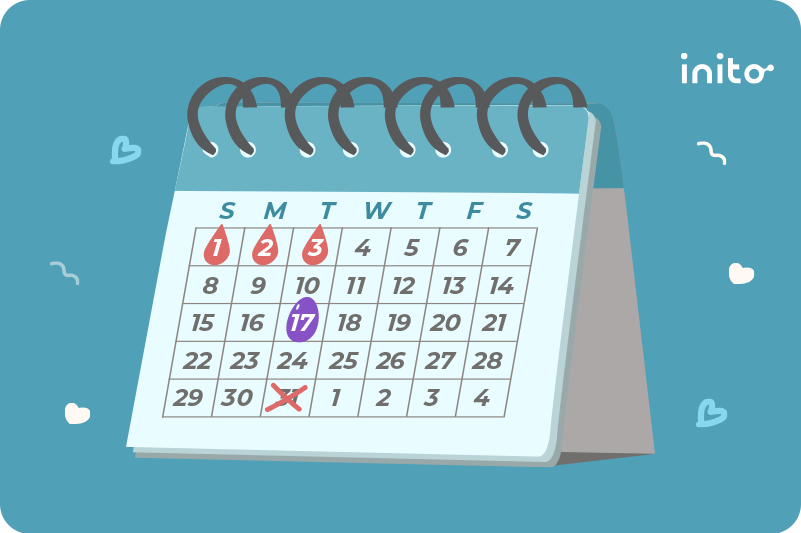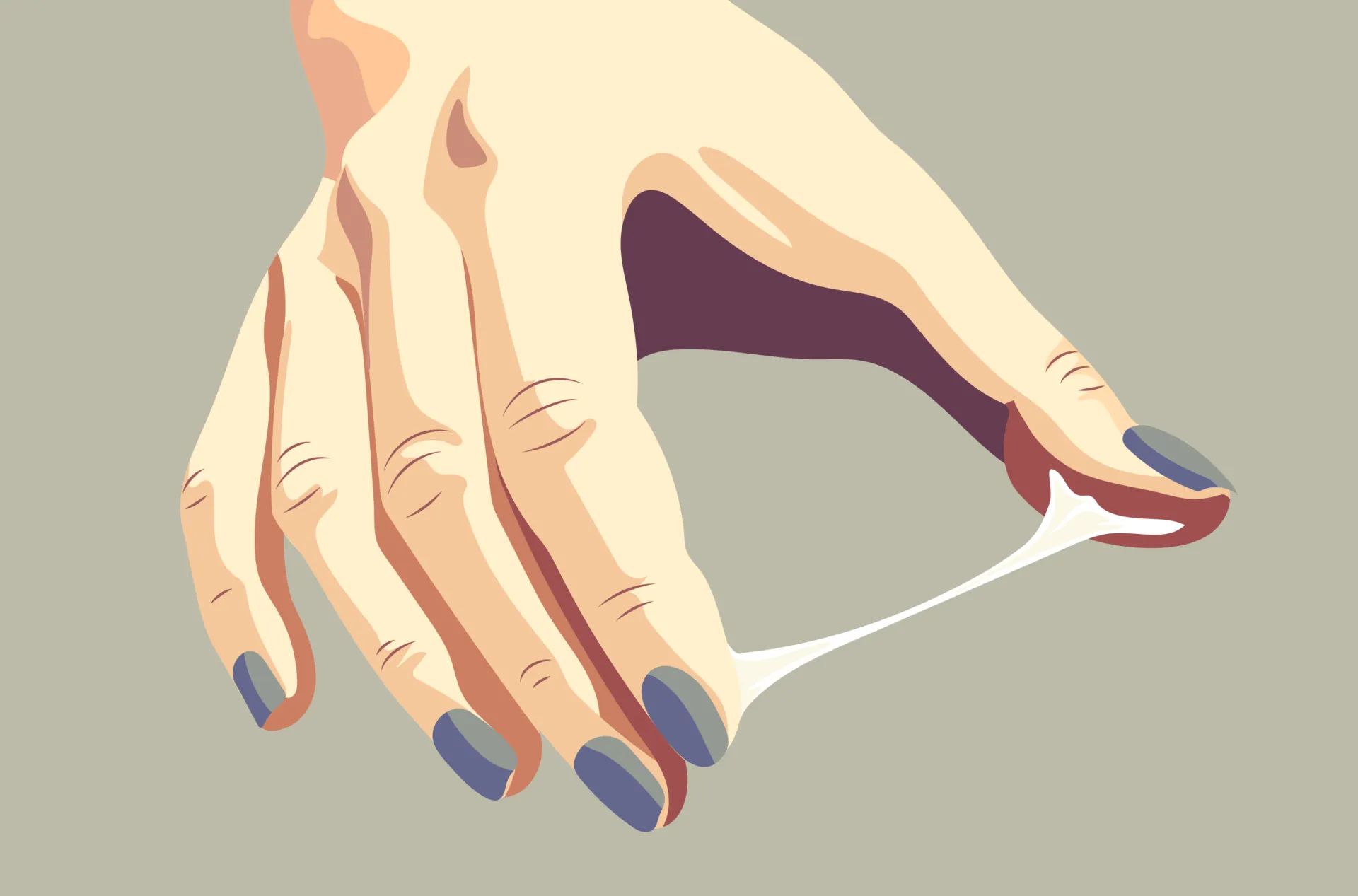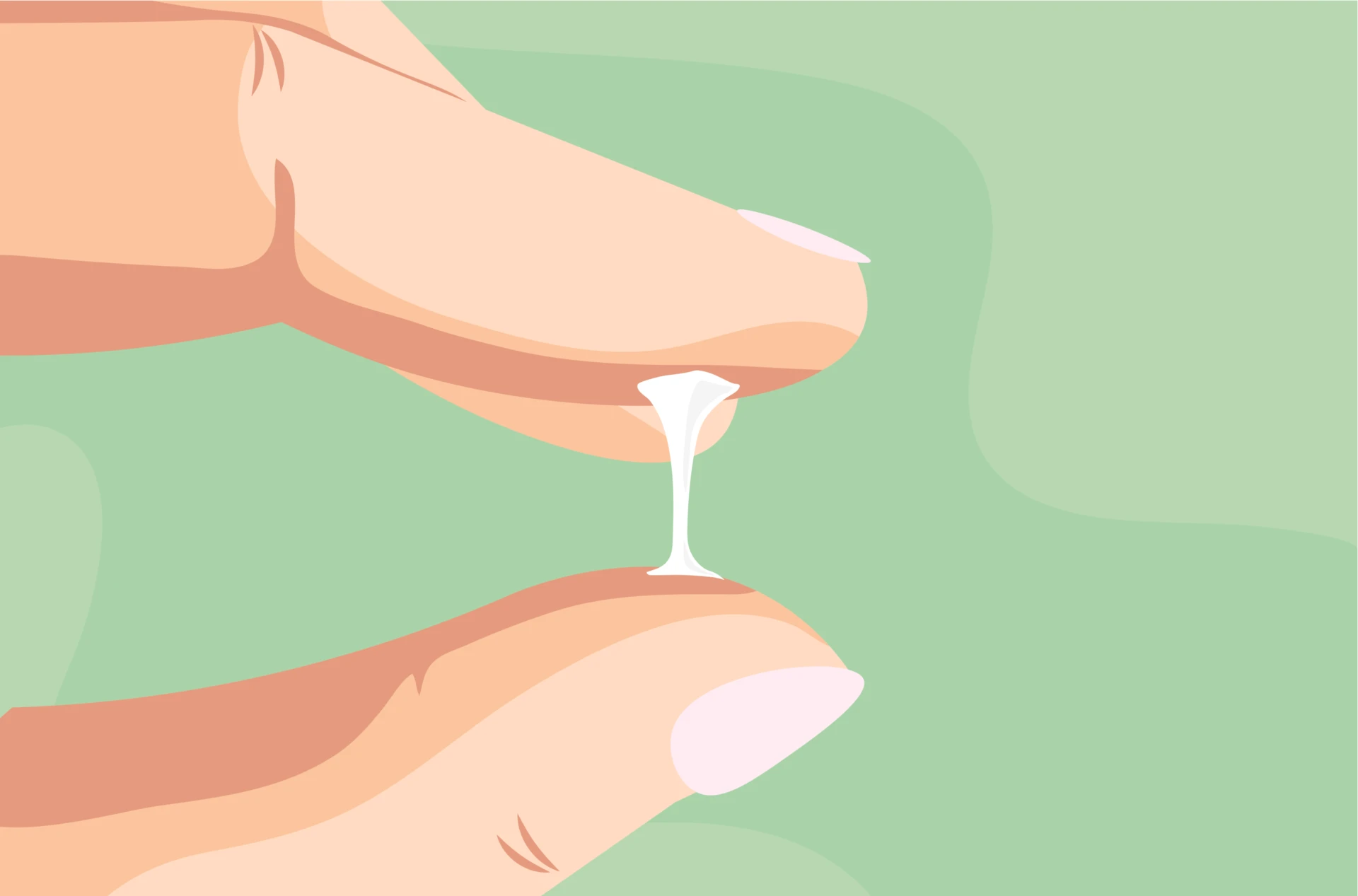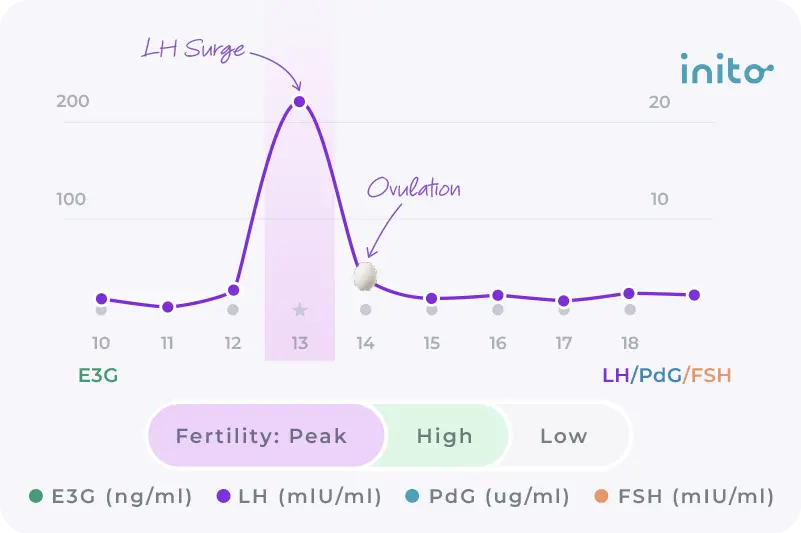Content table
Can you ovulate and not get a period? The short answer is no — it’s not likely. Your period is a result of ovulation. It’s easy to remember if you think of it this way: First comes ovulation, then comes your period.
But there are a few instances where you may ovulate and not have your period. Sounds confusing? Don’t worry. We’ll explain all of that and more in this article.
Ready? Let’s start with the basics.
Ovulation
What is ovulation? Ovulation occurs when a mature egg leaves the ovary and travels down the fallopian tube.
Each month, your hormones ebb and flow to create your menstrual cycle. They work together in a delicate balance to make sure each part of your cycle is completed.
The first hormone to come into play is called gonadotropin-releasing hormone (GnRH). It is secreted by your hypothalamus and triggers your pituitary gland to produce the follicle stimulating hormone (FSH).
FSH then prompts the follicles in your ovaries to mature. Of which only one follicle grows and matures to form an egg.
The dominant follicle produces estrogen to help build the uterine lining for welcoming the egg. At about 3-4 days before ovulation, estrogen peaks, thus alerting the pituitary gland to release the luteinizing hormone (LH).
LH rises about 24-36 hours before ovulation and triggers the release of the mature egg.
Once the egg is released, the follicle that is left behind forms the corpus luteum.
The corpus luteum produces progesterone to nourish and thicken the uterine lining for pregnancy. If the egg is not fertilized, progesterone levels drop and stimulate the uterus to shed its lining, resulting in your period.
Once released, the egg stays in the fallopian tube between 12 to 24 hours while it waits, hoping to meet up with sperm. If the egg doesn’t receive a sperm within that time frame, it breaks down.
After it breaks down, it is released along with the uterine lining during your period. Now, here comes the good part.
If the egg and sperm successfully unite, fertilization occurs, and an embryo is formed. The embryo then moves to the uterus, where it implants in the lining to get nourished and grow.
And that’s when you see the positive result on your pregnancy test. Congratulations! You’re having a baby!
When it comes to ovulation, all you have to remember is that ovulation and periods go hand in hand. A regular period means you’re ovulating. An irregular period means ovulation is irregular or absent.
As you can see, it takes several hormones working in perfect harmony to produce your menstrual cycle each month.
Usually, this cycle runs smoothly. You’ll ovulate then have a regular period. But sometimes, this delicate balance is disrupted and you may not ovulate or have a period. Let’s take a closer look at the relationship between ovulation and your period.
Ovulation and a regular period
Ovulation is easiest to predict when you have a normal period, typically between 21 to 35 days. But one study found that the average cycle is 29.3 days long.
Every woman is unique. The length of your cycle can be very different from that of your mom, sister, or best friend.
Ovulation typically occurs around 12-14 days before your next menstrual cycle.
After ovulation, the lining of the uterus begins to thicken to prepare for pregnancy. If the egg is not fertilized, progesterone levels drop, signaling the uterus to shed its lining.
But what if you have an irregular period? How do you know when you’ve ovulated?
Ovulation and an irregular period
Sometimes ovulation occurs sporadically, or not at all, making your periods irregular. The absence of ovulation is called anovulation.
Anovulation occurs when the ovary does not release an egg during your cycle. When this happens, you won’t have a period.
In healthy women with regular cycles, it’s normal for anovulation to occur once or twice throughout the year. But if anovulation happens frequently, it can cause infertility.
It’s also possible to have some spotting or bleeding, often called breakthrough bleeding, without ovulation. Breakthrough bleeding is caused by the sudden drop in estrogen levels and the failure of progesterone to rise.
That explains ovulation with regular and irregular periods, but what if you don’t have a period at all? Did you ovulate?
Ovulation without a period
It’s rare to ovulate without having a period afterward. But it can happen under certain circumstances like uterine scarring or pregnancy.
Uterine scarring can be caused by reproductive diseases like endometriosis and pelvic inflammatory disease (PID). Medical procedures such as dilation and curettage (D&C) or a C-section can also cause scar tissue to develop in the uterus.
Uterine scarring disrupts the usual thickening of the uterine lining and reduces your menstrual flow. So even though ovulation occurred, you may not have a regular period. You may experience very light bleeding or none at all.
And, of course, if you become pregnant after ovulation, you won’t ovulate again until your pregnancy is complete.
How do I know if I’ve ovulated?
If you have a period, it usually means you ovulated, but not always. To know for sure, you need to check your progesterone levels.
Progesterone starts rising after the egg is released. To confirm ovulation, you should test for PdG (urine metabolite of progesterone) using a fertility monitor like Inito.
There are a few circumstances where you may ovulate and not know it.
- New moms typically start ovulating again between 45 and 94 days after giving birth. But some start ovulating as early as 25 to 27 days after giving birth.
You won’t know that you’ve started ovulating again until you have your first period or get your progesterone levels tested. And yes, getting pregnant again before your first period is possible, even if you’re breastfeeding. - Women with irregular periods may ovulate but not know it until they have their period again. It’s also possible to ovulate and have little to no bleeding due to uterine scarring.
- If you experience a chemical pregnancy, you’ll want to pay special attention to the signs and symptoms of ovulation. A chemical pregnancy happens when the embryo suddenly stops developing, and the pregnancy ends in a miscarriage. It usually happens so early that the woman doesn’t realize she is pregnant.
- When you stop taking birth control pills, it generally takes two to four weeks for ovulation to resume. It might take longer if you’ve been on the pill for a long time.
Even when you know the basics of your cycle, you may still have lots of questions about ovulation. Does that sound like you?
Let’s explore the answers to common questions women have about ovulation, menstruation, and pregnancy.
Can I ovulate without a period if I have PCOS?
Dealing with PCOS can be very frustrating, especially when trying to conceive. PCOS is often associated with anovulatory cycles or cycles where ovulation does not occur. When an egg is not released, the shedding of the uterine lining does not happen — which means no period.
If you have PCOS and don’t have a period, you probably aren’t ovulating.
Learn More: Get Pregnant with PCOS: Your Complete Guide
Can you ovulate without a period during perimenopause?
Perimenopause is when your body makes its natural transition from its reproductive years. This transition usually starts in your 40s. However, some women can experience perimenopause in their 30s or earlier.
The signs and symptoms of perimenopause are different for everyone. For some, perimenopause may only last a short time. For others, it can take more than four years to make it through to menopause.
One of the symptoms of perimenopause is missing periods. During this time, ovulation becomes unpredictable, and so do your periods. In general, your periods get shorter as you age. Some months you might skip your period altogether.
If you’re going through perimenopause and still getting your period, you’re still ovulating. If you skip a period, you likely didn’t ovulate that month.
If I miss my period this month, will I still ovulate?
If you missed your period, chances are good that you did not ovulate this month. Your period means ovulation took place, but the egg was not fertilized.
If you’re a healthy woman with a regular cycle, don’t worry, chances are good that you’ll be back on track and ovulate next month.
Missed periods can happen due to hormonal changes, sudden weight changes, or stress. You could also miss your period if you have PCOS or any other underlying medical condition.
Can I ovulate without a period and get pregnant?
It’s possible! If you normally have regular cycles and miss your period, it could mean that you ovulated and the egg was fertilized, resulting in pregnancy.
It’s also possible that you didn’t ovulate that month, so you didn’t get a period.
After you ovulate, the egg has a small window of opportunity to get fertilized. If it doesn’t get fertilized, you’ll have your period.
The best way to predict ovulation is with a fertility monitor like Inito. It measures all four fertility hormones – estrogen metabolite E3G, follicle stimulating hormone (FSH), luteinizing hormone (LH), and PdG (urine metabolite of progesterone). The rise in PdG helps confirm that you actually ovulated.
Can I ovulate without a period after birth
Yes, it’s possible to get pregnant again after you give birth, but before your next period arrives. Remember that new moms can start ovulating as early as 25 days after giving birth.
Since ovulation occurs about two weeks before your period, you’ll have a fertile window where getting pregnant is possible.
Learn More: Signs of Ovulation While Breastfeeding: Can You Still Get Pregnant?
Can you ovulate without a period for three months?
If you haven’t had a period for three months, you’re probably not ovulating either. In some cases, you may ovulate and not get your period, like uterine scarring or pregnancy.
Uterine scarring can prevent the uterine lining from thickening after ovulation. In that case, you may ovulate but have a very light or no period.
How do you know when you're ovulating if you have irregular periods?
If you have irregular periods but want to know when you’re ovulating, you can do a few things at home.
Take your temperature. Your basal body temperature (BBT) will slightly increase when you ovulate. It typically rises about ½ degree Fahrenheit and remains high for about three days. You’ll need to check your temperature each morning through your cycle and record the results.
Check your cervical mucus. Right before you ovulate, you may notice clearer, more slippery mucus, similar to a raw egg white. After ovulation, it becomes sticky and tacky.
Test with an ovulation predictor kit (OPK). Luteinizing hormone (LH) signals the ovary to release the egg. An OPK can detect LH in your urine and predict your ovulation, but not confirm it.
Can you ovulate twice without a period?
Typically, you ovulate only once every cycle. But you can release two or more eggs at the same time. This is called hyperovulation.
If you go two months without a period, you’re probably not ovulating. Remember, ovulation comes first, and then your period.
Learn More: Can You Ovulate More Than Once In a Month?
Top five things to know about ovulation
Can you ovulate without having a period? The bottom line is if you didn’t get your period, you probably didn’t ovulate. But when you know the basics, you’ll have a better understanding of the relationship between ovulation and your cycle.
- Your period is a result of ovulation. First comes ovulation, then comes your period.
- Ovulation occurs when a mature egg leaves the ovary and travels down the fallopian tube.
- Ovulation typically occurs around 12-14 days before your next menstrual cycle.
- If your cycle is irregular or missing, it could mean that you aren’t ovulating.
- A rise in basal body temperature, a change in the cervical mucus, and a spike in luteinizing hormone are signs of ovulation.
Was this article helpful?
- Ovulation: When do I ovulate? OvulatiReal-world menstrual cycle characteristics of more than 600,000 menstrual cycles | npj Digital Medicine
- Pregnancy possible soon after giving birth | Reuters
- Etiological evaluation of repeated biochemical pregnancy in infertile couples who have undergone in vitro fertilization – PMC












